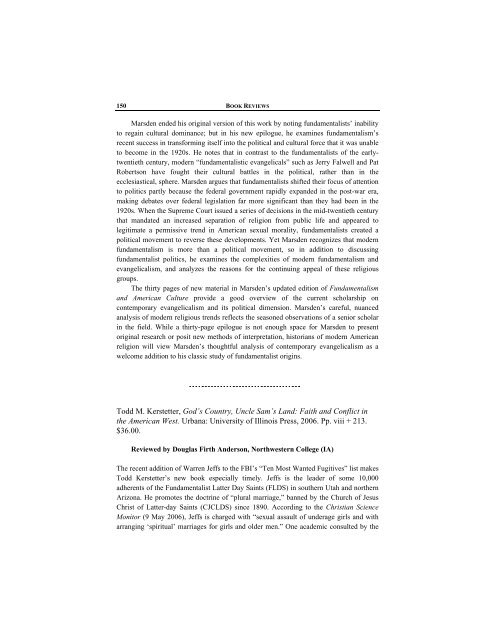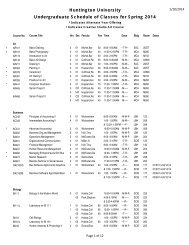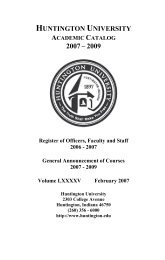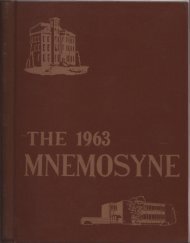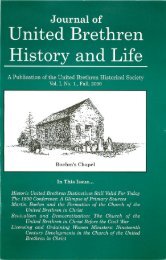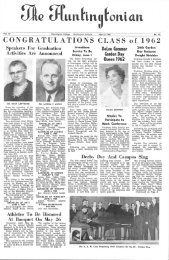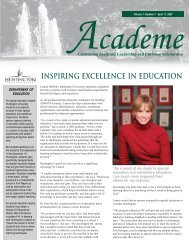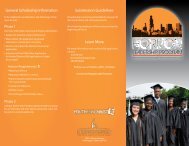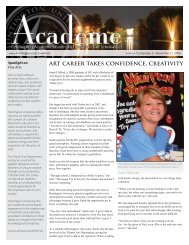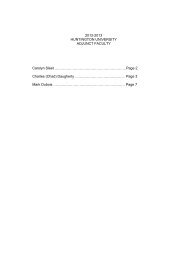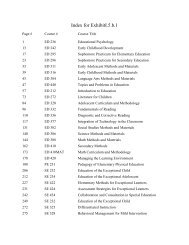Gillian Clark, Christianity and Roman Society - Huntington University
Gillian Clark, Christianity and Roman Society - Huntington University
Gillian Clark, Christianity and Roman Society - Huntington University
Create successful ePaper yourself
Turn your PDF publications into a flip-book with our unique Google optimized e-Paper software.
150 BOOK REVIEWS<br />
Marsden ended his original version of this work by noting fundamentalists’ inability<br />
to regain cultural dominance; but in his new epilogue, he examines fundamentalism’s<br />
recent success in transforming itself into the political <strong>and</strong> cultural force that it was unable<br />
to become in the 1920s. He notes that in contrast to the fundamentalists of the earlytwentieth<br />
century, modern “fundamentalistic evangelicals” such as Jerry Falwell <strong>and</strong> Pat<br />
Robertson have fought their cultural battles in the political, rather than in the<br />
ecclesiastical, sphere. Marsden argues that fundamentalists shifted their focus of attention<br />
to politics partly because the federal government rapidly exp<strong>and</strong>ed in the post-war era,<br />
making debates over federal legislation far more significant than they had been in the<br />
1920s. When the Supreme Court issued a series of decisions in the mid-twentieth century<br />
that m<strong>and</strong>ated an increased separation of religion from public life <strong>and</strong> appeared to<br />
legitimate a permissive trend in American sexual morality, fundamentalists created a<br />
political movement to reverse these developments. Yet Marsden recognizes that modern<br />
fundamentalism is more than a political movement, so in addition to discussing<br />
fundamentalist politics, he examines the complexities of modern fundamentalism <strong>and</strong><br />
evangelicalism, <strong>and</strong> analyzes the reasons for the continuing appeal of these religious<br />
groups.<br />
The thirty pages of new material in Marsden’s updated edition of Fundamentalism<br />
<strong>and</strong> American Culture provide a good overview of the current scholarship on<br />
contemporary evangelicalism <strong>and</strong> its political dimension. Marsden’s careful, nuanced<br />
analysis of modern religious trends reflects the seasoned observations of a senior scholar<br />
in the field. While a thirty-page epilogue is not enough space for Marsden to present<br />
original research or posit new methods of interpretation, historians of modern American<br />
religion will view Marsden’s thoughtful analysis of contemporary evangelicalism as a<br />
welcome addition to his classic study of fundamentalist origins.<br />
Todd M. Kerstetter, God’s Country, Uncle Sam’s L<strong>and</strong>: Faith <strong>and</strong> Conflict in<br />
the American West. Urbana: <strong>University</strong> of Illinois Press, 2006. Pp. viii + 213.<br />
$36.00.<br />
Reviewed by Douglas Firth Anderson, Northwestern College (IA)<br />
The recent addition of Warren Jeffs to the FBI’s “Ten Most Wanted Fugitives” list makes<br />
Todd Kerstetter’s new book especially timely. Jeffs is the leader of some 10,000<br />
adherents of the Fundamentalist Latter Day Saints (FLDS) in southern Utah <strong>and</strong> northern<br />
Arizona. He promotes the doctrine of “plural marriage,” banned by the Church of Jesus<br />
Christ of Latter-day Saints (CJCLDS) since 1890. According to the Christian Science<br />
Monitor (9 May 2006), Jeffs is charged with “sexual assault of underage girls <strong>and</strong> with<br />
arranging ‘spiritual’ marriages for girls <strong>and</strong> older men.” One academic consulted by the


